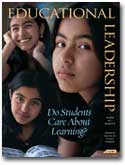It's the challenge at the heart of teaching and learning: How do we motivate students to learn? Fortunately, readily accessible resources on the Internet can help us construct learning environments that engage students.
Motivating Students to Learn
According to the research on student motivation, if children are to become engaged in the learning process, their basic physical and psychological needs must be met first. The Learning First Alliance, a coalition of 12 leading education groups, identifies these needs and the core elements of safe and supportive learning communities in its publication Every Child Learning: Safe and Supportive Schools. To view this report as a PDF file, go to the Learning First Alliance Web site (www.learningfirst.org) and click on “Publications.”
The February 2002 issue of ASCD's Infobrief, “Student Engagement: Motivating Students to Learn,” addresses the role of the family and the school in promoting student engagement, essential characteristics of schools that motivate student learning, promising practices that foster student motivation, and the potential unintended consequences of high-stakes testing for student engagement. Go to ASCD's Reading Room (www.ascd.org) and click Infobrief.
Northwest Regional Educational Laboratory (NWREL) offers an overview of the research on student motivation, examples of how schools are working to engage students, and suggestions for adapting these ideas to your own school in Increasing Student Engagement: From Time-on-Task to Homework (www.nwrel.org/request/oct00/textonly.html).
Service Learning
Service learning can reverse student disengagement from schooling. The National Commission on Service Learning's report, Learning In Deed: The Power of Service Learning for American Schools (http://learningindeed.org/index.html), gives an overview of the research on service learning's impact on student engagement and presents examples of educators who have made use of this powerful instructional tool.
The Commission's Web site also provides a guide to service learning resources on the Web for teachers (http://learningindeed.org/map.html).
The National Service Learning Clearinghouse (www.servicelearning.org/library/index.html) covers many service learning issues and provides links to Web-based service learning newsletters, electronic mailing lists, and lesson plans.
Motivating Children with Special Needs
To learn more about differentiating instruction to engage all students, you can access excerpts from Carol Ann Tomlinson's book Differentiated Instruction: Responding to the Needs of All Learners and a related study guide (www.ascd.org).
Motivating academically gifted students in heterogeneous classrooms can be challenging. EAGER (Encouraging Achievement-Gifted Education Resources), a Web site of the Department of Education in Western Australia (www.eddept.wa.edu.au/gifttal/EAGER/UAch-Offline.html), provides information about identifying underachieving gifted students, their special needs, and motivational teaching strategies.
Place-Based and Experiential Education
What is place-based education? Place-Based Curriculum and Instruction, an ERIC Digest (www.ael.org/eric/digests/edorc006.htm), provides answers to questions about this strategy for engaging students in their communities.
The Foxfire approach to teaching and learning, an innovative, experiential, and place-based model, has been used by teachers at all grade levels and content areas, and with both urban and rural students. The ERIC Clearinghouse on Rural Education and Small Schools provides an introduction to this approach (www.ael.org/eric/digests/edorc986.htm). The Foxfire Web site (www.foxfire.org) gives information about the Foxfire approach, training programs for teachers, and publications.
The Association for Experiential Education offers an extensive list of links to organizations, electronic mailing lists, research, and other resources relevant to experiential learning (www.aee.org/resources/eeguide.html).
